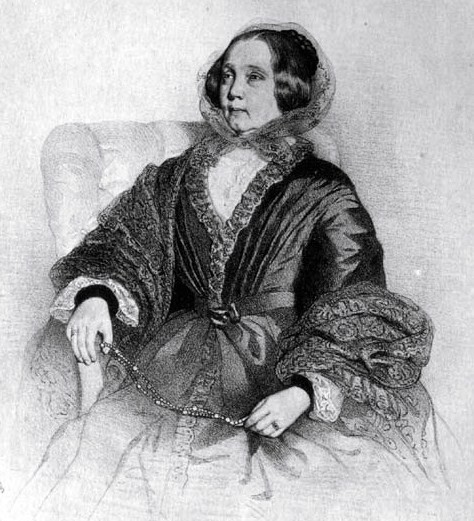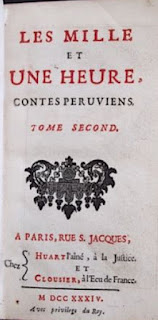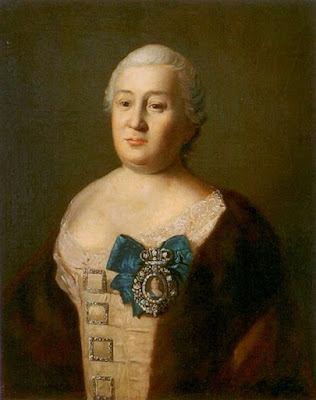010*. E. М. Frolova-Bagreeva (née Speranskaja) / Е. М. Фролова-Багреева (рожд. Сперанская)
Elizaveta Michajlovna Frolova-Bagreeva (1799-1857), born Speranskaja, is next. Since her birthdate was missing from the NEWW list that provides most of our names, she was assigned "1700" as a default, putting her smack in the middle of the eighteenth century, though her rightful place is much later – in the middle of the nineteenth century. So we find her name out of chronological order (hence the "*" by her number), another look ahead at women's writing a few generations after the empress Elizaveta Petrovna (which is where we left off with our historical progression). Frolova-Bagreeva is a very interesting case, and one not selected for inclusion in the 1994 Dictionary of Russian Women Writers. Indeed, she illustrates several ways in which women writers can slip through the cracks of the canon and all but disappear. Although her life was not as dramatic as Ksenija Borisovna Godunova's (see our last post), it had some very sharp ups and downs. Frolova-Bagreeva lost her mother at a young age and was raised and educated by her father, M. M. Speranskij, a powerful statesman and close advisor to Alexander I – until his sudden fall in 1812 and subsequent internal exile. Speranskij's remarkable and meteoric rise from the modest family of a priest was mirrored by his precipitous decline, resulting from his failure to ingratiate himself or otherwise collaborate with members of the nobility who surrounded the tsar (Raeff 25-26). In the years between 1812 and 1821, when Speranskij's exile ended and he was allowed to return to the capital, he moved between a series of posts in provincial cities. Elizaveta Michajlovna, who sometimes accompanied him and sometimes did not, spent time during these years in Kyiv, where she had maternal relatives, Nižnij Novgorod, and perhaps Siberia.
What Speranskij's fall might have felt like to the twelve- or thirteen-year-old Elizaveta Michajlovna is obliquely suggested by her image in Tolstoj's War and Peace (vol. 2, pt. 3, ch. 18) as part of the backdrop in the Speranskij household, the domestic environment that so disenchants the idealistic Prince Andrej Bolkonskij. Up to that moment enamoured of Speranskij and ready to join him in reforming Russia, Bolkonskij is negatively impressed by seeing his idol behind-the-scenes at home in the vulgar company that Tolstoj suggests Speranskij habitually kept. Frolova-Bagreeva appears here as a solemn and silent child flanked by a governess; regarding her father quietly, she seems to reproach him for her lonely childhood, a lack of attention, and the impending fall from grace that would soon alter the circumstances of their life together. Perhaps Tolstoj was inspired by the portrait above. His version of her life with father, it should be noted, was written before the 1868 publication of Speranskij's letters to his daughter, which indicate a very different type of relationship. Even from a distance during years of separation (1816-1820), Speranskij continued to oversee Elizaveta Michajlovna's excellent education, his love and solicitude attested in virtually every line that was penned from Penza and Siberia. Full of details about Elizaveta Michajlovna's upbringing (and by extension the education of young ladies), these letters could easily become a translation project.
After a decade in exile, the family saw another rapid change in the trajectory of its fate. Speranskij returned to Petersburg in 1821, and Elizaveta Michajlovna became a member of the court as lady-in-waiting to the Empress Elizaveta Alekseevna (wife of Alexander I); the following year she married Aleksandr Frolov-Bagreev, governor of Chernigov, who soon moved to Petersburg in connection with the Ministry of Finance. The couple lived in the capital with Speranskij, where Elizaveta Michajlovna was at the center of a lively and sociable home and Frolov-Bagreev ascended the career ladder of the civil service to eventually become a highly placed statesman himself. Whether Frolova-Bagreeva knew N. P. Averina, the daughter of her father's less elite colleague, is unknown.
Prior to marriage, Elizaveta Michajlovna's literary efforts included poetry and translations, such as a song from Walter Scott's Lady of the Lake and an excerpt from Madame Lambert on education. Many of her early texts were submitted to her father, who critiques them in his letters. Her first published work appears to have been Readings for Young Children (Чтение для малолетних детей, 1828), presumably written when she herself was a young mother, and later translated into German and French. She may also have written a prose tale in Russian that appeared in Puškin's journal The Contemporary (Современник), but the fact that Frolova-Bagreeva continued throughout her life to produce writings that were never printed – and that she rarely published in Russian –undoubtedly contributed to her failure to gain an unambiguous position in a canon of Russian women writers. Elizaveta Michajlovna's late mother may have been an Englishwoman; at any rate, she knew English, German, and French. She was, in fact, better known abroad, where she published in German and more often French under the name "Mme Bagréeff-Spéranski."
There are different versions of Frolova-Bagreeva's life. Russian Wikipedia describes her as famous for her flagrant infidelity, reporting a number of colorful scenes, while the Russian Biographical Dictionary, our primary source on her life for this post, refrains from recounting episodes of wanton behavior to focus on the difficult life of a brave and talented woman. Towards which version of the future does Tolstoj's somber child incline? Whatever the state or evolution of her marriage, it seems that Frolova-Bagreeva traveled in Germany after her father died in 1839. And when the eldest of her three children died in 1844, killed during a drinking bout while serving in the Caucasus, she set off for the Holy Land in search of consolation. When she returned in 1847, her husband (from whom she appears to have been separated) had also died and Frolova-Bagreeva moved to her estates in Ukraine, where she reportedly took an interest in good works and in the welfare of her peasants. In 1850, she moved to Vienna and again became the center of an educated literary and artistic circle until her death, after which she was interred in the Russian Orthodox cemetery there.
Much of Frolova-Bagreeva's published writing is from the years in Vienna according to the list found in Golicyn (257-59), comprising 32 texts, manuscript and printed, written in Russian, German and French. Among them are travel sketches (Iceland, "a voyage to the Orient", Kyiv); "reflections" and "meditations" on religious themes; the volume Russian Pilgrims in Jerusalem (Les pélerins russes à Jérusalem, 1854); and a series of sketches addressing life in the Russian Empire (e.g. The Last Hours of His Majesty Emperor Nicholas/Les dernières heures de sa Majesté l'Empereur Nicolas, An Old Believer and His Daughter/Le starowère et sa fille, A Tungus Family/Une famille toungouse, The Neva Islands of St. Petersburg/Les îles de la Néva à St.-Pétersbourg; The Old Woman and Her Crow/La vieille et son corbeau). The French writer Prosper Mérimée apparently praised Frolova-Bagreeva's style and averred that such tales increased his desire to visit Russia. She also published novels in French -- such as Life in a Castle in Ukraine (La vie de château en Ukraine, 1857) and Irene, or The Benefits of Education (Irène ou les bienfaits de l'éducation, 1857); wrote plays in German (unpublished comedies and a verse tragedy, as well as The Cossack-Tsar/Ein Kosaken-Czar, 1855); and poems addressed to the poet Avdot'ja Pavlovna Glinka (1795-1863) that were published with Frolova-Bagreeva's obituary in 1857. A decade after her death, the linguist Victor Duret published a book dedicated to Frolova-Bagreeva and to her work (Un portrait russe, Leipzig, 1867), which included the so-called A Woman's Book (Le livre d'une femme), a miscellany of aphorisms and meditations that Frolova-Bagreeva wrote towards the end of her life (1845-1857). She also authored recollections of her father at the request of his biographer, baron A. N. Korf.
Many of Frolova-Bagreeva's French texts are available online and might be tracked down for analysis or translation. Indeed, I am happy to report that her life and literary production, a rich and underexplored subject, has recently become the topic of an undergraduate thesis and I hope to return with a clearer idea of her biography and writings in a subsequent post.
FURTHER
READING
"Frolova-Bagreeva,
Elizaveta Michajovna." In Russkii biograficheskii slovar', vol. 21 (SPb.: Tip. V. Bezobrazova, 1901), 233-34.
Korf,
M. A. "Žizn' grafa Speranskogo". Vol. 1 and Vol. 2. SPb.:
Imperatorskaja Publičnaja biblioteka, 1861.
"P.
V. B." [P. V. Bykov?]. "Frolova-Bagreeva, Elizaveta
Michajovna." In Entsiklopediceskij slovar' Brokgauza i Efrona, vol. 36A (SPb.: Semenovskaia Tip., 1902), 811.
Raeff,
Marc. Michael Speransky, Statesman of Imperial Russia, 1772-1839. The
Hague: Martinus Nijhoff, 1957.
Speranskij,
M. M. "65 pisem M. M. Speranskogo k ego docheri iz Penzy i sdorogi v Sibir'" and "Pis'ma Speranskogo k ego docheri,Elizavete Michajlovne, s dorogi v Sibir', iz Sibiri i s vozvratnogoottuda puti, 1819 i 1820." Russkij archiv 1868, n. 7-8,
1103-1212 (65 letters) and n. 11: 1681-1811 (94 letters).
ILLUSTRATIONS
1. Drawing of E. M. Frolova-Bagreeva as a young girl (courtesy of RussianWikipedia).
2. Portrait of M. M. Speranskij by A. G. Varnek (1824) (courtesy of RussianWikipedia).
3. Cover of La vie de château en Ukraine (courtesy of Google Books).
4. Drawing of E. M. Frolova-Bagreeva with a rosary (courtesy of RussianWikipedia).
5. Cover of Un portrait russe and Le livre d'une femme (courtesy of Gallica).
3. Cover of La vie de château en Ukraine (courtesy of Google Books).
4. Drawing of E. M. Frolova-Bagreeva with a rosary (courtesy of RussianWikipedia).
5. Cover of Un portrait russe and Le livre d'une femme (courtesy of Gallica).







Comments
Post a Comment